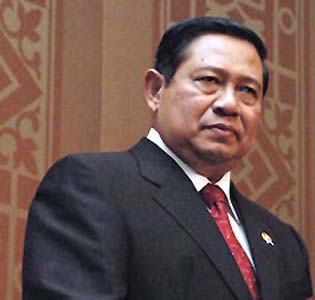Indonesian presidential poll seen as cementing stability
 Jakarta - Indonesians go to the polls Wednesday in a vote that was expected to hand incumbent President Susilo Bambang Yudhoyono a second five-year term and cement the country's hard-won political and economic stability.
Jakarta - Indonesians go to the polls Wednesday in a vote that was expected to hand incumbent President Susilo Bambang Yudhoyono a second five-year term and cement the country's hard-won political and economic stability.
Opinion polls indicated that Yudhoyono, popularly known by his initials SBY, would win more than 60 per cent of the vote and avoid a September run-off. He needs to win more than 50 per cent of the ballots and more than 20 per cent of the vote in half the country's 33 provinces to prevent a second round of voting.
Yudhoyono, 63, won the country's first direct presidential election in 2004 on pledges to root out corruption, alleviate poverty and spur economic growth. He has made good on some of the promised measures, particularly a crackdown on graft, although some people see progress in other areas as being slow.
The president's popularity dipped in the first half of last year after the government increased fuel costs amid soaring global prices.
His rating rebounded after he introduced a cash handout scheme to 19 million poor families and later that year cut fuel prices three times in line with falling global prices.
"Indonesians want political and economic stability to continue, so SBY is considered the most attractive choice," said Sunny Tanuwidjaja, a political analyst at the Center for Strategic and International Studies in Jakarta.
Although a former general, Yudhoyono is largely untainted by excesses associated with the 32-year military-backed rule of dictator Suharto, who stepped down in 1998 amid widespread protests at the height of the Asian financial crisis.
The protests degenerated into rioting that left more than 1,000 people dead in Jakarta.
The president, who holds a doctorate in agriculture economics, has won praise for what many see as sound management of the economy amid the current global financial crisis.
Indonesia was expected to post growth of 3 to 4 per cent this year, bucking the global recessionary trend, mainly because the country does not rely too heavily on exports.
Yudhoyono has picked an economist and former central bank governor with a reputation for competence, Boediono, as his vice presidential running mate after Yudhoyono's Democratic Party won the most votes in legislative elections in April.
In a sign that democracy is flourishing in the world's most populous Muslim nation, three rounds of televised debates were held among the three presidential candidates and their running mates, but the exchanges shed little light on policy details.
Yudhoyono's closest rival, former president Megawati Sukarnoputri, was scoring less than 20 per cent in opinion polls.
Megawati, whose term as president from 2001 to 2004 was seen as ineffective, has promised to create double-digit growth, reschedule Indonesia's foreign debt, and promote agriculture and fisheries as part of what her campaign called a "people-oriented economy."
Her running mate, former general Prabowo Subianto, has been accused by activists of human rights violations during his time in the military but has rebranded himself as a champion of farmers, small traders and fishermen in a series of slick TV advertisements in the run-up to the April elections.
The other candidate, Jusuf Kalla, the current vice president and head of the Golkar Party, once Suharto's political vehicle, has taken credit for some of the government's successes, including the peace pact that ended decades of separatist conflict in Aceh province.
Kalla, who is teaming up with a former armed forces chief with a checkered human rights reputation, Wiranto, has criticized Yudhoyono as indecisive and claimed that he himself makes decisions "faster and better."
Tanuwidjaja said Yudhoyono's rivals lacked credentials to persuade voters that they could bring changes for the better.
"Yudhoyono has demonstrated what he can do in the past five years while voters are not sure about what kind of changes the other candidates have in store," Tanuwidjaja said.
More than 176 million of Indonesia's 230 million people are registered to vote, but the spectre of post-election unrest was raised after the campaign teams of Megawati and Kalla charged that millions of voters were not registered by the election commission and that millions of names on the voter lists were fictitious.
"There's a big chance there could be a lot of cheating during the elections," Megawati told foreign correspondents last week.
In response to the complaints, the Constitutional Court ruled Monday that unregistered voters could still cast their ballots by showing their official identification cards at polling stations in their respected areas. (dpa)